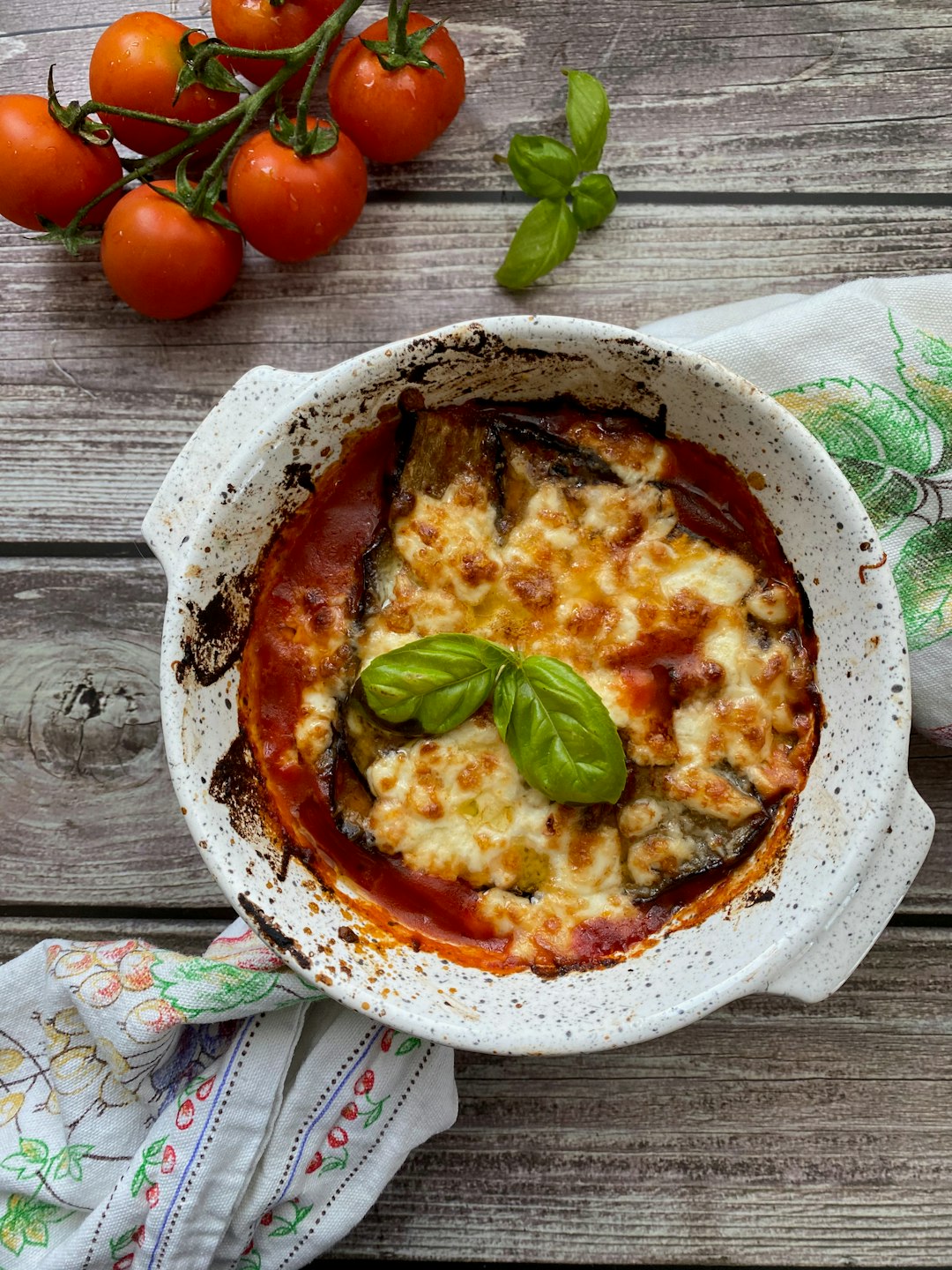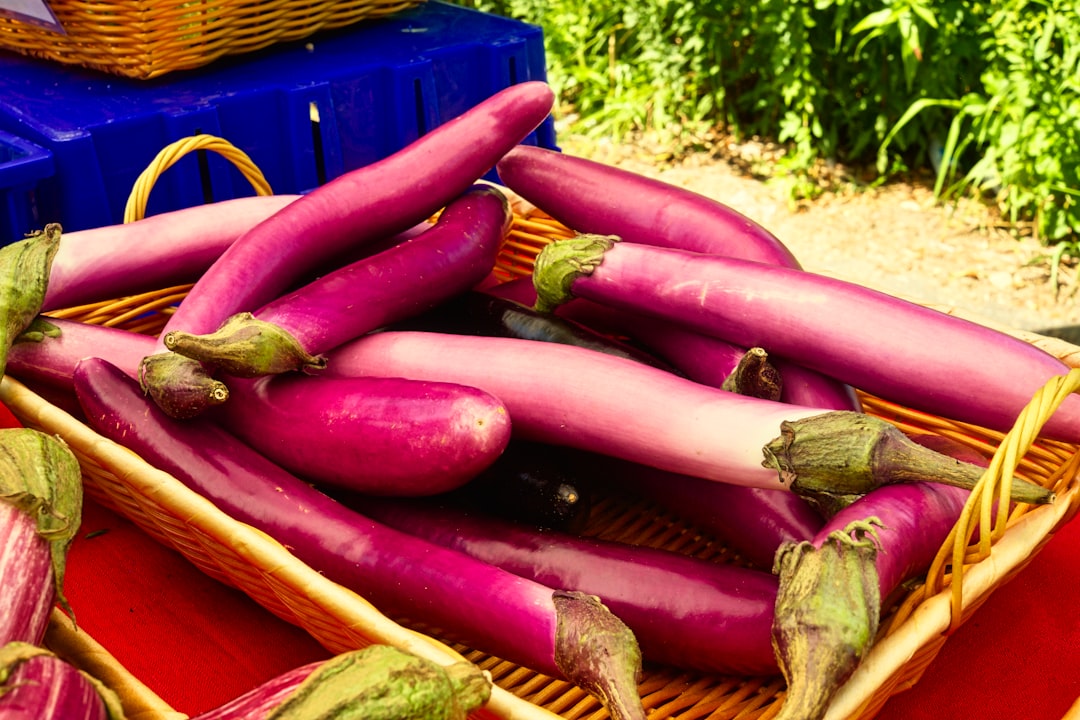Eggplant
When cooked, the eggplant has a distinct spongy texture, absorbing the flavors of the surrounding ingredients to become a study in flavor. It is also surprisingly versatile, allowing chefs to create a variety of dishes with it, ranging from traditional Provençal ratatouille to Italian-style eggplant parmesan.
It turns out that the eggplant has many unexpected health benefits as well. It is a rich source of dietary fiber and antioxidants, helping to improve digestion and reduce the oxidative damage caused by free radicals. What's more, the phytonutrients present in the eggplant make it an effective source of anti-inflammatory support, making it an ideal choice for people suffering from inflammation-related conditions.
The eggplant can also be found on a variety of tables around the world thanks to its delectable taste. Its mild flavor and creamy texture make it a popular choice for those looking for something a bit different from the usual fare. Unlike other fruits, the eggplant lacks any tartness which makes it a more mellow and balanced dish.
All in all, the eggplant is an incredibly valuable addition to any kitchen. With its unique texture, versatility, nutrition, and taste, it is sure to offer culinary delights for a long time to come.
Eggplant dishes
A selection of Eggplant dishes.
Lasagna
Lasagna is a glorious dish that embraces the spirit of Italian cuisine as a whole. From its humble roots to its modern incarnations, it has become a staple in kitchens during times of celebration, hardship, and everything in-between. Its ingredience are simple, yet when combined create a flavourful harmony.
LasagnaCaponata
Caponata is a traditional Sicilian dish that is beloved throughout Italy and the world over. Fragrant and complex, this savory stew contains many heartwarming ingredients that mingle deliciously together in an array of tantalizing flavors. To create a caponata, eggplant is typically fried until lightly charred and then combined with capers, olives, tomatoes, celery, onions, and pine nuts. Garlic, anchovies, and vinegar add surprising acidic notes which give the dish its signature tanginess.
CaponataCacciatore
Cacciatore (Italian for "hunter-style") is a savoury and tantalizing Italian dish hailing from the regions of Rome and Florence. It is a hearty and robust one-pot dish made with a base of tomatoes, onions and peppers, and traditionally includes the addition of mushrooms, olives and herbs such as oregano, rosemary and thyme. The list of ingredients might vary between different families and home cooks, but the end result is always infused with an irresistible aroma that will bring smiles to all who try it.
CacciatoreDahi baigana
Delving into the enchanting realms of culinary delights, we embark on an awe-inspiring journey through the ethereal land of Odisha, where flavors dance upon the taste buds, leaving a symphony of sensations to bask in. Amidst this gastronomic adventure lies a dish that encapsulates the essence of Odia cuisine - the beguiling Dahi Baigana.
Dahi baiganaEggplant salads and appetizers
In the realm of culinary delights, where flavors intermingle and textures harmonize, there exists a humble vegetable that captivates both the curious and the connoisseurs alike. Its glossy purple skin, concealing a tender flesh, gives birth to a myriad of alluring dishes, tantalizing taste buds and broadening culinary horizons. Ladies and gentlemen, let us embark on a sensory journey through the vast and diverse realm of eggplant salads and appetizers.
Eggplant salads and appetizersParmigiana
The homeland of Parmigiana is Italy, and it is rightfully celebrated as one of its most iconic dishes. This delicacy has been around for more than two centuries, and over time has become beloved by foodies not only in Italy, but all over the world.
ParmigianaFried aubergine
Fried aubergine, oh how its sizzling golden exterior beckons with an alluring promise of velvety delight within! This humble dish dances gracefully upon the symphony of flavors, caressing our palates with its tender flesh and whispering notes of succulent sweetness. Each crispy bite delivers a divine amalgamation of textures – the delicate crunch yielding to a luscious creaminess that lingers on the tongue.
Fried aubergineAlinazik kebab
If you're looking for a flavourful and sumptuous culinary experience unlike any other, look no further than Alinazik kebab. Originating in the stunning Turkish city of Gaziantep, Alinazik kebab truly embodies the lavishness of traditional Turkish cuisine.
Alinazik kebabBerenjenas de Almagro
The air in the sleepy village of Almagro exhilarates with gastronomic intrigue. Berenjenas de Almagro, a unique local dish of fried eggplant coins, is one beloved delicacy that has stood the test of time. Long before the region was discovered by the modern culinary world, this delightful dish has been savoring its existence in the Castilian countryside.
Berenjenas de AlmagroDi san xian
Di San Xian, a dish of humble origins, has gained near-mythological status in recent years. It is an ancient Chinese specialty, crafted from three simple ingredients - potatoes, eggplant, and bell peppers - yet somehow imbued with a soul-nourishing richness that has captivated the hearts and minds of diners across the globe.
Di san xianIsraeli eggplant salad
Growing up in the Middle East, Israeli Eggplant Salad played an integral part in my childhood. This simple but hearty dish has stood the test of time, having been served for decades on tables throughout Israel, the Mediterranean region and beyond.
Israeli eggplant saladEggplant
Eggplant is one of the most versatilicious of vegetables, and a real treat for many hungry souls. Its texture can range from spongy to almost crunchy when fried. Its flavor, too, varies depending on how it's cooked; roasted it takes on an intense smokiness, while steaming will bring out more sweetness.
No matter which cooking technique you choose, eggplant is an excellent vessel to craft flavorful dishes with whatever ingredients you like. For starters, try brushing it in olive oil and herbs before roasting it in the oven. Or, slice it into thick rounds and sauté it in garlic and onions. Its inherent blandness helps it integrate seamlessly into whatever cuisine you're exploring.
When it comes to dietary preferences, eggplant is a great friend in the kitchen. Not only does it have a meaty bite, but vegans and vegetarians alike can enjoy it without breaking their diets. It's filling, nutritious, and pairs surprisingly well with a variety of proteins, from salmon to lentils.
To get the most out of your eggplant, consider pairing it with other bold flavors. For example, immerse it in a creamy tomato and basil sauce and pair it with a rich Italian cheese like mozzarella or Parmesan. Or, amp up its smokiness with a sprinkle of paprika or chili powder and serve it alongside a crisp-yet-tangy Greek salad.
Certain cuisines lend themselves particularly well with eggplant. Consider layering it in a luxurious Turkish moussaka or coating it in spices and chickpea flour for a classic Indian bhaji. And of course, no discussion of eggplant would be complete without mentioning the delicious Italian classic— eggplant parmesan.
However you choose to enjoy this delectable vegetable, it's sure to make your meals even more scrumptious. Keep experimenting and pushing the boundaries when it comes to eggplant dishes– you'll be surprised at how versatilicious it can be.
History of Eggplant
The mysterious eggplant is a vegetable that has been around for centuries. It is believed to have originated in India, although the exact origin of this enigmatic food source is still debated.
The name comes from the Romanization of the Tamil word "vatingana", which translates to "brinjal". Interestingly, the Latin word "melongena" was also used to refer to eggplants, which appears to be derived from the Greek phrase "mela-gena," meaning apple (mela) and offspring (gena).
It seems that eggplants were probably first domesticated and taken from the wild in India, with the earliest reference to them being found in a Sanskrit medical treatise dated to the 5th century BCE. From there, they spread throughout the Middle and Far East, where they became very popular in regions such as China, Japan, Persia, and Turkey.
The eggplant was introduced to Europe by Arabs during the Middle Ages, where it spread out from the Mediterranean region. It quickly became popular and was grown in many Italian gardens by the 16th century, with the Italians being credited with inventing the Parmigiana di Melenzane dish, a classic Italian casserole created with layered eggplant slices.
Today, the eggplant has become a staple in many cuisines, both exotic and familiar. Its versatility and heartiness make it a great vegetarian substitute for meat, and it can be prepared in a variety of unique ways, like stuffing, frying, baking, grilling, sautéing, and pickling.
At the end of the day, the eggplant continues to captivate us with its mysterious past and versatile applications. The next time you come across an eggplant, take a moment to ponder its enigmatic journey from the wilds of India all the way to your dinner plate.



















